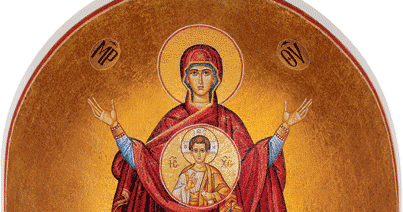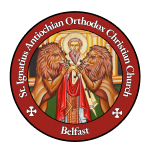Dear Brothers and Sisters,
Blessed Feast of the Nativity of the Theotokos!
This is weekly newsletter #20 of the St Ignatius Parish in Belfast
Contents of this Newsletter:
- Message from Fr Dmitry: Church services in the coming week
- News and Announcements
- Homily on the Feast of Nativity of the Theotokos: Hear the Word of God and keep it!
Message from Fr Dmitry: Church services in the coming week
Dear brothers and sisters,
I wish you all a blessed Feast of the Nativity of the Theotokos, celebrated on the 8th of September. You can read more about the history and meaning of the Feast here: https://www.antiochian.org/regulararticle/137
To continue the celebration of the Feast in the coming days, and to ask for the intercessions of the Mother of God, we will serve the Paraklesis to the Theotokos during our Faith & Fellowship meeting this week. This will take place as usual on Wednesday, 10th September, at 7:00 PM (UK time) on Zoom: https://ucl.zoom.us/j/97707660214
Since the Paraklesis is a longer service, we need to allocate the chanting roles in advance. If you would like to help with chanting, please contact me as soon as possible so I can include you in the rota.
Also, if during the Paraklesis you would like us to pray for any specific people who are living Orthodox Christians (including yourself of course :-)) , please submit their names to me by email or text before the service on Wednesday, and I will remember those names in the litanies.
God willing, we will gather at the church this coming weekend, 13–14 September. This weekend we will receive two of our catechumens, Corey and Carl, into the Orthodox Church through Baptism and Chrismation, and we will also celebrate the Feast of the Exaltation of the Holy Cross.
Address of the Church: Cullen Memorial Hall, Methodist Complex, 381 Donegall Road, Belfast, BT12 6GR
Schedule of Services
Saturday, 13th September
17:00 – Great Vespers, followed by our regular fellowship in the kitchen with tea/coffee
Sunday, 14th September
10:00 – Baptism and Chrismation of Corey and Carl
11:00 – Divine Liturgy, followed by a fasting parish lunch
I will be available for confessions and private conversations on Saturday after Great Vespers, and on Sunday morning from 8:30 until 9:30 am at the church, before we begin the services.
I hope to see you all this weekend, and I pray that God grants us a joyful time of fellowship and celebration!
News and Announcements:
- Welcome to the new community in our Archdiocese – St Hilda’s of Whitby Orthodox Church in Halifax. On Saturday, 6th September, 34 people were received into the Orthodox Church by His Eminence Metropolitan Silouan. These were members of the former evangelical community led by Pastor Doug Clark, who for the past two years have been on the path towards reception into the Orthodox Church, under the supervision of Sayedna Silouan and with the pastoral support of several priests and communities of our Archdiocese.
On Sunday, the first hierarchical Divine Liturgy was celebrated at St Hilda’s parish, during which Doug Clark was ordained into the Holy Diaconate, receiving the name Caedmon.
Congratulations to our newly illumined brothers and sisters in Christ, and Axios to the newly ordained Deacon Caedmon!
You can read the two-part report about this joyful occasion on the Archdiocesan website:
Part 1: https://www.antiochian-orthodox.com/post/the-journey-home-from-halifax-to-antioch-part-1
Part 2: https://www.antiochian-orthodox.com/post/the-journey-home-from-halifax-to-antioch-part-2
Festal Gospel and Homily: Hear the Word of God and keep it
The reading from the Holy Gospel according to St Luke (10:38-42; 11:27-28):

At that time, Jesus entered a village; and a woman named Martha received Him into her house. And she had a sister called Mary, who sat at Jesus’ feet and listened to His teaching. But Martha was distracted with much serving; and she went to Jesus and said, “Lord, dost Thou not care that my sister has left me to serve alone? Tell her then to help me.” But Jesus answered her, “Martha, Martha, you are anxious and troubled about many things; one thing is needful. Mary has chosen the good portion, which shall not be taken away from her.” As Jesus said this, a woman in the crowd raised her voice and said to Him, “Blessed is the womb that bore Thee, and the breasts that Thou didst suck!” But Jesus said, “Blessed rather are those who hear the Word of God and keep it!
Homily: Hear the Word of God and keep it
In the Name of the Father, and of the Son, and of the Holy Spirit.
On most feasts dedicated to the Holy Mother of God, the Church gives us the same set of scriptural readings. At Orthros we hear Luke 1:39–49; 56, which tells of the meeting between St Elizabeth, pregnant with John the Baptist, and Virgin Mary, her sister, who carries in her womb our Lord Jesus Christ. From this Gospel we receive the words, spoken by the Theotokos, that we still sing every Sunday in Orthros – the Magnification: “My soul magnifies the Lord…” which is then followed by the hymn “More honorable than the Cherubim…”
At the Divine Liturgy, we usually hear the reading from Luke 10:38–42; 11:27–28. At first glance, this Gospel may not seem to relate directly to the Theotokos. One might even think that Christ is minimizing His Mother’s role. A woman in the crowd calls out: “Blessed is the womb that bore Thee, and the breasts which Thou didst suck!” But Christ answers: “Blessed rather are those who hear the word of God and keep it.”
If taken superficially, this might sound like a rebuke of the Mother of God. But such a reading would be a mistake. In fact, Christ is pointing precisely to what His holy Mother did. She is the one who heard the word of God from the Archangel Gabriel (Luke 1:26–38): “Hail, full of grace, the Lord is with thee… Behold, thou shalt conceive in thy womb, and bring forth a son, and shalt call his name Jesus.” And she accepted the Word of God with humility: “Behold the handmaid of the Lord; be it unto me according to thy word.”
Thus, the blessedness of the Theotokos is not simply because she bore Christ in her womb, but because she had already prepared herself by a life of purity, obedience, and humility. The honor of bearing the Savior into the world was the fruit of her holiness. From her childhood in the temple she cultivated the greatest of virtues – humility.
If we look at her life, we do not find the outward signs we commonly tend to associate with sainthood, such as martyrdom, extreme asceticism, hermit life. Instead, her path is one of quietness, humility, perseverance, and attentiveness to the will of God. She follows her Son through every step of His earthly life, even to the Cross. She speaks rarely in the Gospels, but she is always present, offering silent strength and maternal care.
Can we imitate her? Yes. And here the story of Martha and Mary becomes a helpful contrast. Mary (different person from the Theotokos) and Martha are the sisters of Lazarus, whom Christ raised from the dead (John 11). Lazarus later became the first bishop of Cyprus and is glorified as a saint in the Orthodox Church.
When Christ visits their home (Luke 10:38–42), Martha busies herself with serving, anxious to make everything perfect for her Guest. Mary, however, simply sits at the Lord’s feet, listening to His word. Christ gently corrects Martha: “Martha, Martha, you are anxious and troubled about many things; one thing is needful. Mary has chosen the good portion, which shall not be taken away from her.”
Christ does not condemn Martha’s service, but teaches that listening to the divine word is the greater portion, because it endures forever.
In the same spirit, when the woman in the crowd cries out, praising the Mother of Christ, Jesus’ response was not a rejection of her, but a revelation of the deeper truth. As St. Augustine of Hippo writes: “Mary is more blessed in receiving the faith of Christ, than in conceiving the flesh of Christ”; and “Her nearness as a Mother would have been of no profit to Mary, had she not borne Christ in her heart after a more blessed manner than in her flesh” (De Sancta Virgin. iii)
So we see: the Mother of God is blessed because she heard and kept the Word of God. Mary, the sister of Lazarus, is blessed because she chose to sit at the Lord’s feet and listen. And we, too, are invited into this blessedness.
Humility means not seeking to impress with our activity, but quietly sitting with Christ, open to His word. When was the last time we truly did this? Even in church, we may find ourselves distracted: priests thinking about how to lead, chanters about the music, parishioners about fellowship, or all of us about work and daily tasks. These things are not bad, they are part of our life. But if they cloud our attention to God, then we miss the one thing which is truly needed.
So, brothers and sisters, let us learn from Mary, the sister of Lazarus, and above all from the Most Holy Theotokos. Let us strive to be humble and attentive to God’s word and to keeping it, so that our hearts and minds may be open to the mystical communion with Him. Amen!
Yours in Christ,
Fr Dmitry
